|
|
|
Sort Order |
|
|
|
Items / Page
|
|
|
|
|
|
|
| Srl | Item |
| 1 |
ID:
174551
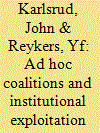

|
|
|
|
|
| Summary/Abstract |
While the increasingly thick web of global, regional and sub-regional security arrangements and institutions has received ample scholarly attention, the phenomenon of ad hoc military coalitions and how they impact these institutions has been relatively little explored. We examine ad hoc coalitions in international security responses and develop a tentative typology of military responses that takes ad hoc coalitions into consideration, where we differentiate in terms of institutionalisation and duration. Following a rational-choice institutionalist logic, we argue that institutional proliferation increases the chances of institutional exploitation. We illustrate this with how states apply a pick-and-choose approach in which institutional products but not frameworks are used. They use the interoperable forces, a common culture and mainstreamed doctrine, but not the formal deployment of rapid response mechanisms of eg the North Atlantic Treaty Organization and the African Union. In closing, we observe that institutional proliferation in international security facilitates a functionalist approach mainly inspired by national self-interest. Future research should examine whether this could result in dwindling relevance of international institutions, first in the domain of security, but later also in other domains.
|
|
|
|
|
|
|
|
|
|
|
|
|
|
|
|
| 2 |
ID:
174549
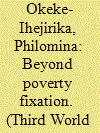

|
|
|
|
|
| Summary/Abstract |
This paper draws on fieldwork at three camps for internally displaced persons (IDPs) in Northeast Nigeria. It interrogates the pre-displacement experiences of participants, their transition to and experiences of internal displacement, vignettes of life at IDP camps, their relationship with host communities, the non-universality of experiences of sexual and gender-based violence among female IDPs (despite the particularities of experiences of women and young girls) and the resilience and agency of IDPs. The paper argues that scholarly engagement with IDPs and their social conditions should go beyond fixation on or fetishisation of poverty. Overall, the paper contributes to the empirical literature on conditions of internal displacement in sub-Saharan Africa.
|
|
|
|
|
|
|
|
|
|
|
|
|
|
|
|
| 3 |
ID:
174556
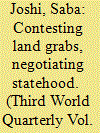

|
|
|
|
|
| Summary/Abstract |
In Cambodia, rural citizens embroiled in protracted land grabbing cases with the state and private companies are turning increasingly to international accountability mechanisms for resolution. This article applies the interlinked concepts of hybrid governance and legal pluralism to understand the prospects and limitations of ‘forum-shopping’ through appeals to international mechanisms for rural communities affected by land grabs. Drawing on interviews and using process tracing, it examines the outcomes of a mediation case filed with the International Finance Corporation’s Compliance Advisor/Ombudsman (CAO) involving indigenous groups and a Vietnamese rubber company in north-east Cambodia. It argues that while international accountability mechanisms yield platforms for dispossessed groups to assert claims, they also reify choices between entitlements and attainability without circumventing the problems associated with justice delivery under Cambodia’s authoritarian regime. Overall, this study highlights the interaction, competition and collaboration between distinct forms of regulatory authority exercised by national and transnational actors involved in land grabbing cases in Cambodia, demonstrating their role in ‘negotiating statehood’ by governing local claims to land.
|
|
|
|
|
|
|
|
|
|
|
|
|
|
|
|
| 4 |
ID:
174555


|
|
|
|
|
| Summary/Abstract |
Hezbollah is a holistic network whose social, political, military and cultural dimensions are all parts of a discourse of resistance. Conducting a qualitative frame analysis of speeches by Hezbollah’s General Secretary Nasrallah, supported by interviews with Hezbollah leadership privy to its ideology, this study analyses the construction of muqawama (resistance). It argues that resistance is a complex social phenomenon, which can be manifested, for example, in the differences in how resistance is framed in varying contexts, often addressing different audiences. However, three unifying themes emerged from the frame analysis: diversity of resistance, normalisation of resistance and social dimensions of resistance.
|
|
|
|
|
|
|
|
|
|
|
|
|
|
|
|
| 5 |
ID:
174552
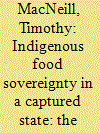

|
|
|
|
|
| Summary/Abstract |
This study explores the emergence of the Afro-Indigenous food sovereignty movement in the context of a captured Honduran state and unequal political economy. In contrast with national-level research that has advocated a policy of food security in the context of non-indigenous campesino movements, this work explains how food sovereignty is more appropriate regarding Garifuna Hondurans. In a political economy that has precluded other options, and given the deep cultural relation that Garifuna activists have to land and autonomy, food sovereignty provides a possibility around which Indigenous development can be animated. It encapsulates a local ‘fight’ response to repression as an alternative to northern ‘flight’, often via migrant caravans, that many Garifuna have undertaken. This study shows how food sovereignty, more than being a technical policy set, is a discursive and material node through which dispossessed and especially indigenous populations can enhance decolonial power in the contestation of entrenched hegemonic and institutionalised power in a corrupt, unequal and colonised political economy.
|
|
|
|
|
|
|
|
|
|
|
|
|
|
|
|
| 6 |
ID:
174554


|
|
|
|
|
| Summary/Abstract |
This article addresses an important empirical puzzle: why has the United States, without exception, chosen not to intervene in the six humanitarian catastrophes in post-war Asia, namely in Indonesia, East Pakistan/Bangladesh, Cambodia, East Timor, Sri Lanka and Myanmar? We use an eclectic approach that blends arguments about the international normative structure and geostrategic interests to examine what has made the absence of humanitarian intervention in Asia by the US possible and legitimate. Specifically, we focus on the paradox between calls for humanitarian intervention and the historically and geographically contingent social construction of the norms of humanity, national sovereignty and United Nations-backed multilateralism in conjunction with US and Chinese concerns over their regional geostrategic interests. The normative narratives about race, ‘communists’, ‘terrorists’, international order and inclusive multilateral processes, and the geostrategic interests of the US and China, combine to make non-intervention possible and legitimate.
|
|
|
|
|
|
|
|
|
|
|
|
|
|
|
|
| 7 |
ID:
174548
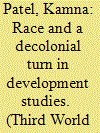

|
|
|
|
|
| Summary/Abstract |
This paper reviews and revives a longstanding conversation about race and development studies, which was prominently explored in a collection of papers on race and racism in the journal Progress in Development Studies back in 2006. This revival is timely in the context of a global call to decolonise higher education. Given the central logic of race and racism in European colonialism, and the decolonial argument that colonialism continues in the production and value of knowledge, I examine the presence and absence of race and racism in discussions of decolonising higher education and in development studies. Through a systematic review and content analysis of papers published in six major development studies journals over the past 13 years, I identify where and how race is present in current development scholarship and explore the implications of this for a decolonial turn in development studies.
|
|
|
|
|
|
|
|
|
|
|
|
|
|
|
|
| 8 |
ID:
174553
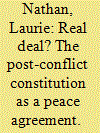

|
|
|
|
|
| Summary/Abstract |
When intra-state armed conflicts end through a negotiated settlement, the conflict parties frequently agree to amend or replace the country’s constitution. Their aim is to entrench the settlement, address the conflict incompatibility, reform institutions and take other measures to prevent a recurrence of violence. This article argues that post-conflict constitutions (PCCs) should be understood as peace agreements. It motivates this argument on conceptual, functional and legal grounds. It demonstrates that PCCs comply with conventional definitions of a peace agreement, are an intrinsic component of the conflict resolution process and have a range of peace maintenance functions. As supreme law, they become the definitive peace agreement. Research on peace durability following negotiated settlements should therefore focus not only on comprehensive peace agreements (CPAs) but also on PCCs. PCCs should be conceived not as mere components of CPA implementation but as substantive political and legal agreements in their own right and as independent causes of peace.
|
|
|
|
|
|
|
|
|
|
|
|
|
|
|
|
| 9 |
ID:
174550
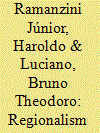

|
|
|
|
|
| Summary/Abstract |
The aim of this article is to analyse the performance of regionalism in the Global South through a comparative analysis of Mercosur and Ecowas with regard to the trade and democracy protection agendas, by contrasting their institutional design and regional leadership concerning the two issues. Firstly, it analyses the evolution of intra-regional trade as well as the trade agenda of each bloc concerning international negotiations with other states or economic blocs. Secondly, it discusses the relevance of democratic stability in the two regional organisations and how each organisation has performed in cases of democratic rupture in member states. When comparing the dynamics of the two organisations, we argue that differences in terms of institutional design and regional leadership have meant that Ecowas has been less ambitious than Mercosur in its trade agenda, but more decisive vis-à-vis the region’s democratic stability. Thus, this article aims to contribute to the comparative regionalism literature, setting out an analytical comparative framework for assessing the performance of regional organisations, which remains a difficult task for this particular research agenda.
|
|
|
|
|
|
|
|
|
|
|
|
|
|
|
|
|
|
|
|
|